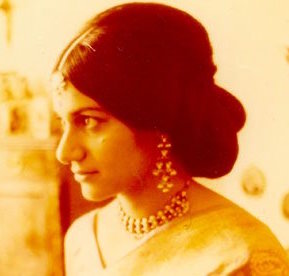 Mala Sen was born in Mussoorie in the northern Indian state of Uttarakhand in 1947. Her parents divorced in 1953, and Mala grew up with her father. As member of the military he moved often, taking his daughter with him. In Mumbai, she attended the Nirmala Niketan College, studying home science.
When she was 15 Mala met Farrukh Dhondy, and they fell in love. The couple eloped in 1965 when Mala was 17, and moved to Britain where she took up sewing jobs in sweatshops to earn a living. They both became involved in race equality activism and writing, joining the Race Today collective.
Mala Sen was born in Mussoorie in the northern Indian state of Uttarakhand in 1947. Her parents divorced in 1953, and Mala grew up with her father. As member of the military he moved often, taking his daughter with him. In Mumbai, she attended the Nirmala Niketan College, studying home science.
When she was 15 Mala met Farrukh Dhondy, and they fell in love. The couple eloped in 1965 when Mala was 17, and moved to Britain where she took up sewing jobs in sweatshops to earn a living. They both became involved in race equality activism and writing, joining the Race Today collective.
In the early 1970s the Bengali community in Spitalfields grew rapidly, but faced intense racism and prejudice, including discrimination in access to housing. Families were forced to live in a single room in slum conditions .
In 1976 Mala Sen, Dhondy, and other activists worked with local families to create the Bengali Housing Action Group (BHAG). They broke into and squatted empty buildings, challenged racism and pressured the council to improve housing. One of the key squatted properties were the Pelham Buildings on Woodseer Street, which were awaiting GLC redevelopment. Within three months 41 families were living there.
Although many Bengali women were not allowed to take part in activities outside the home, they played an important role even so. Housing campaigner Charlie Forman commented: “It has been women who have been most militant about staying in the Spitalfields area. They stand to lose more than their men, and have frequently dissuaded the men from signing for distant flats even when there is apparently no other choice.”
Through the activities of the BHAG and other housing campaigners, the dire situation many immigrant families was highlighted and improvements were made to tackle the racism inherent in the council housing system.
Sen believed that supporting people to claim their rights and empower themselves was the best way to achieve political change. She said: “When you are a political activist, you empower other people to take their chance to empower themselves.”
As a journalist and researcher Mala Sen encountered the story of 'bandit queen' Phoolan Devi, and gained Devi's trust, encouraging her to dictate her experiences in a series of diaries which Sen used to write a book about her story. A controversial film followed, which Devi initially opposed and sued Sen. The case was settled out of court and Devi and Sen remained close up until Devi's assassination in 2001.
Mala Sen withdrew from public life in later years. She began writing a book about women and HIV but died in 2011 before it was finished.
Sources





